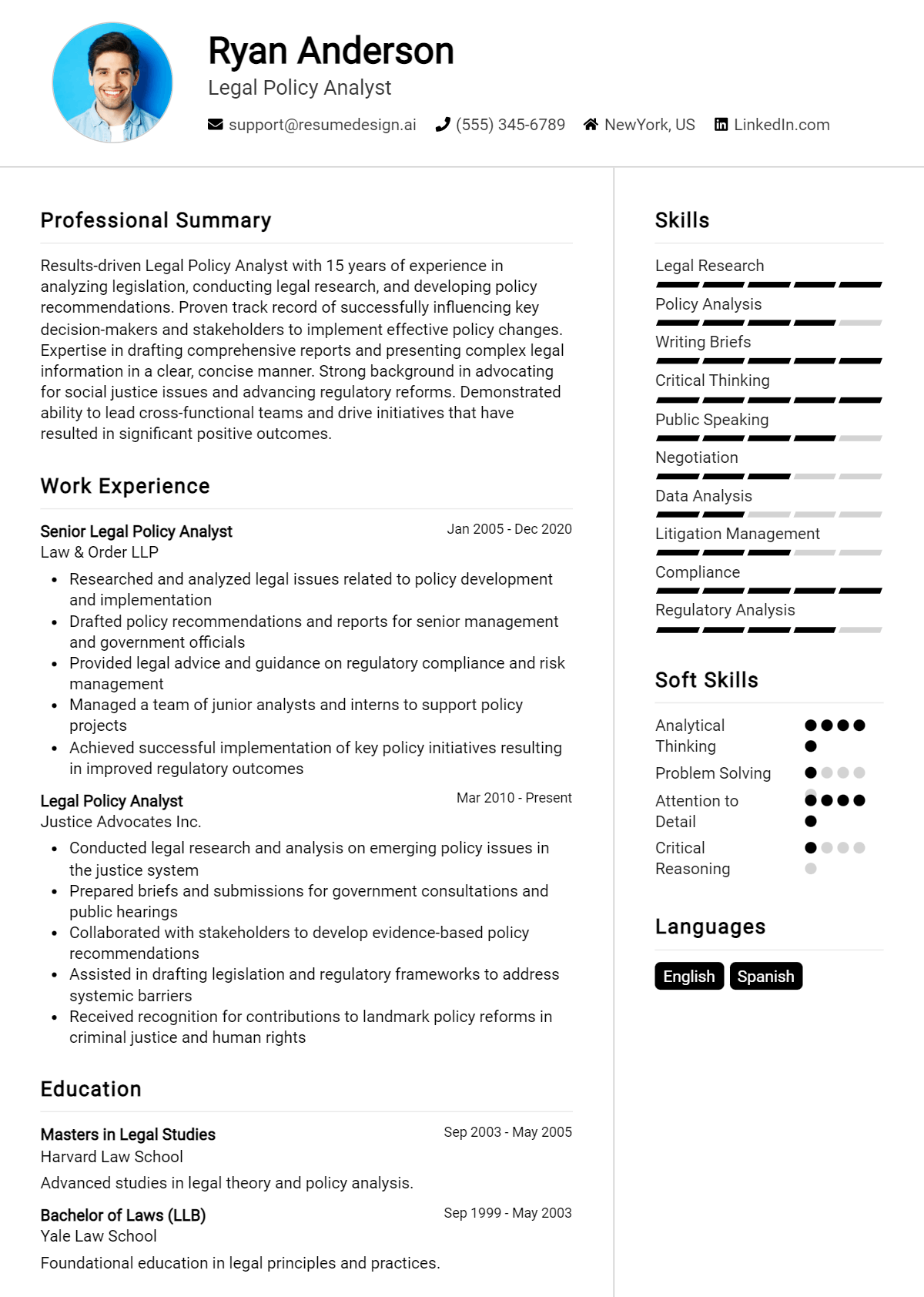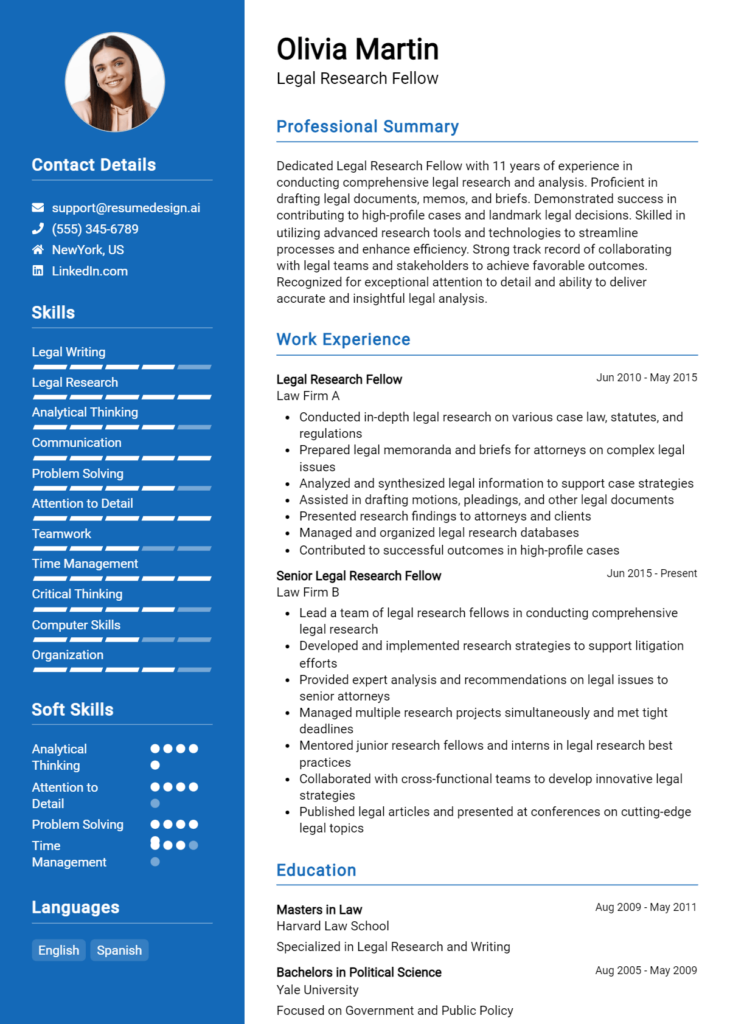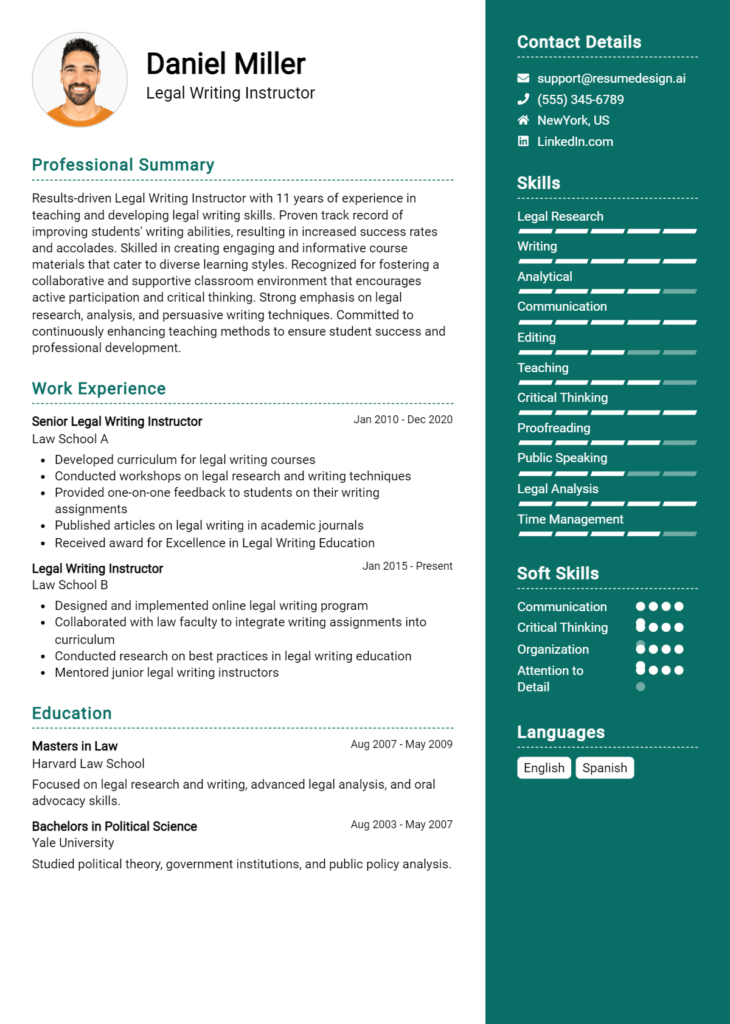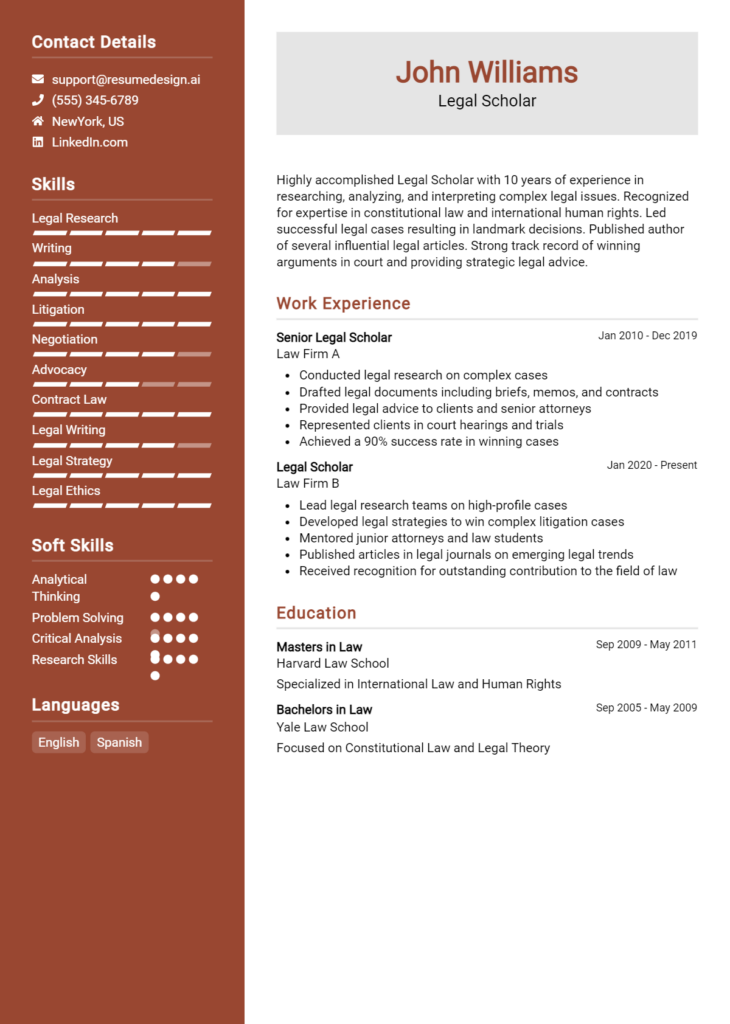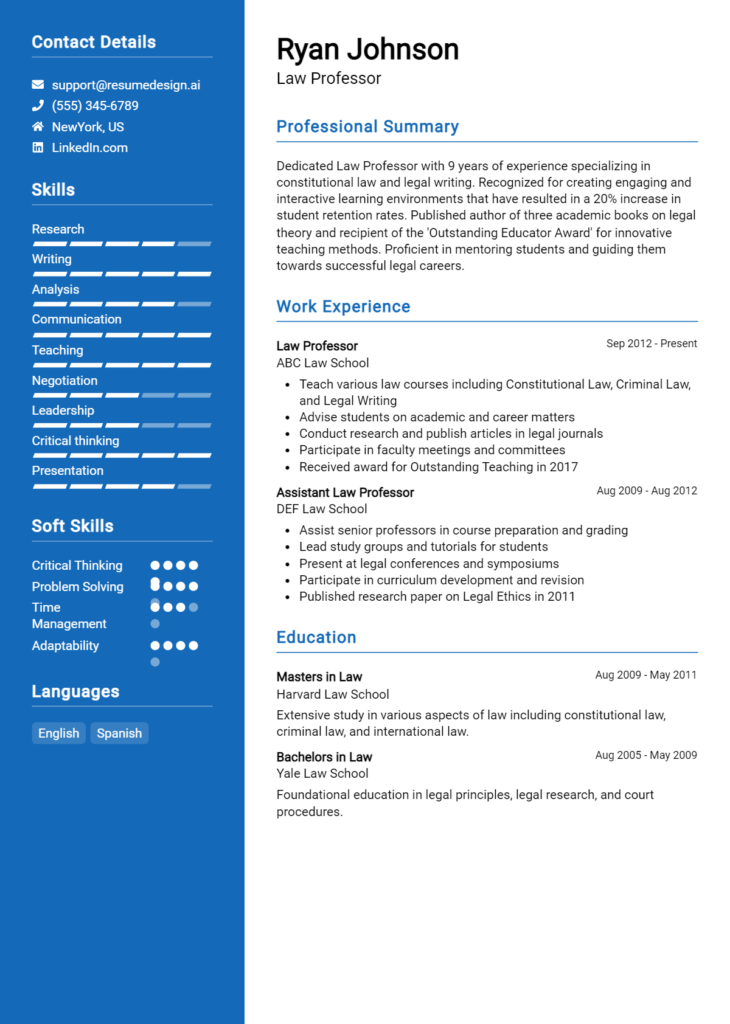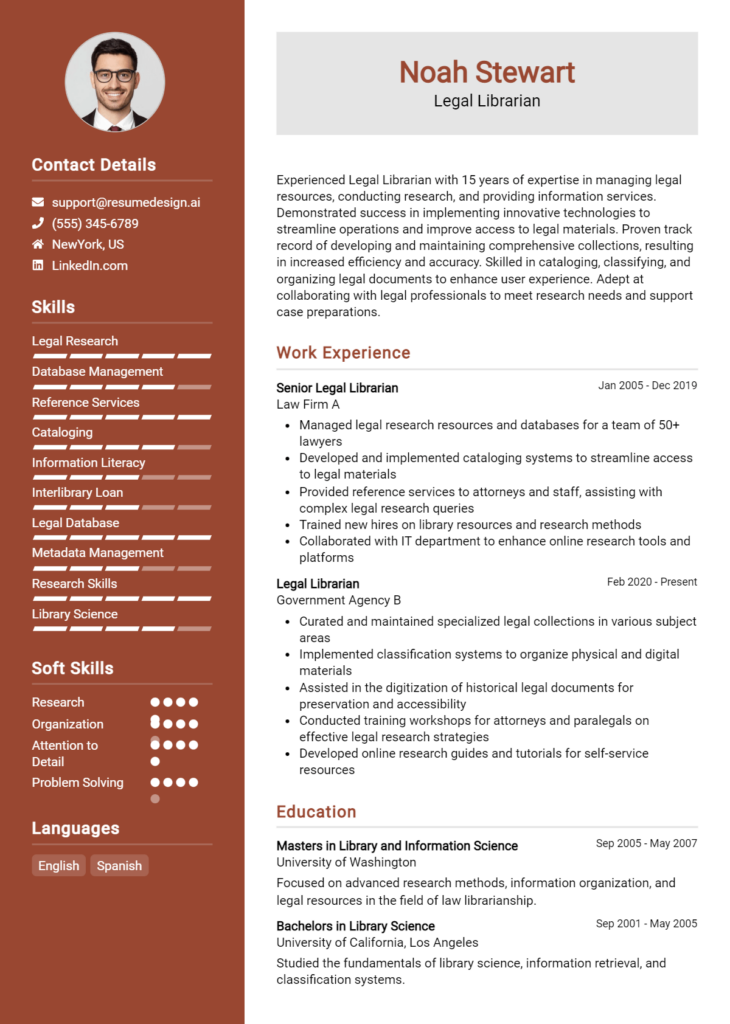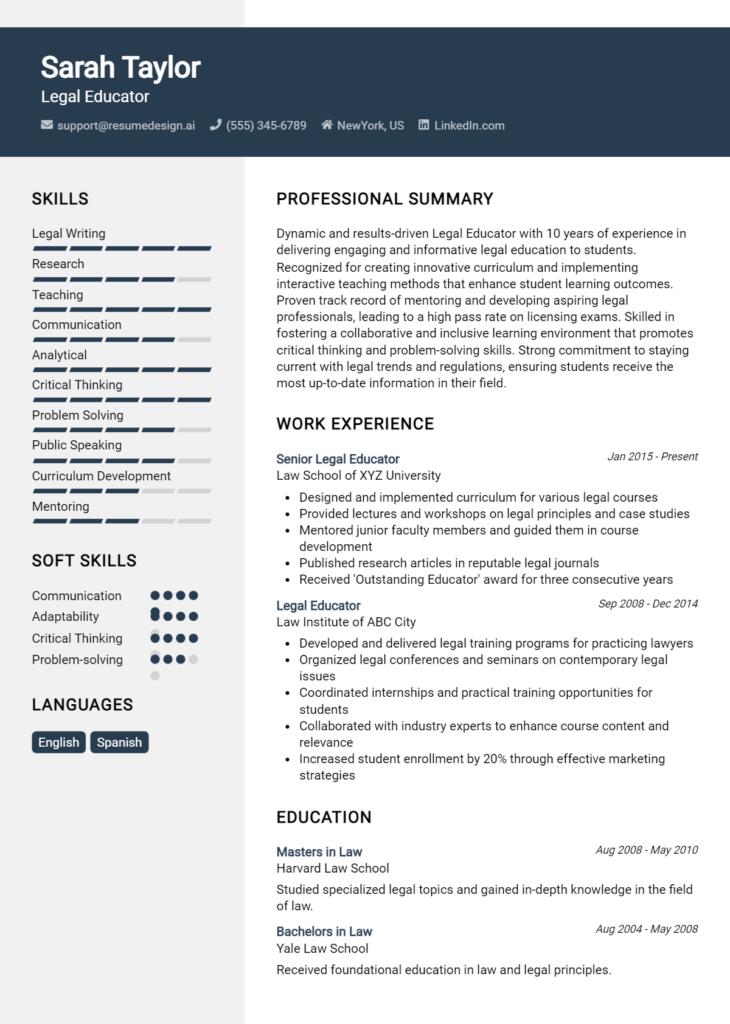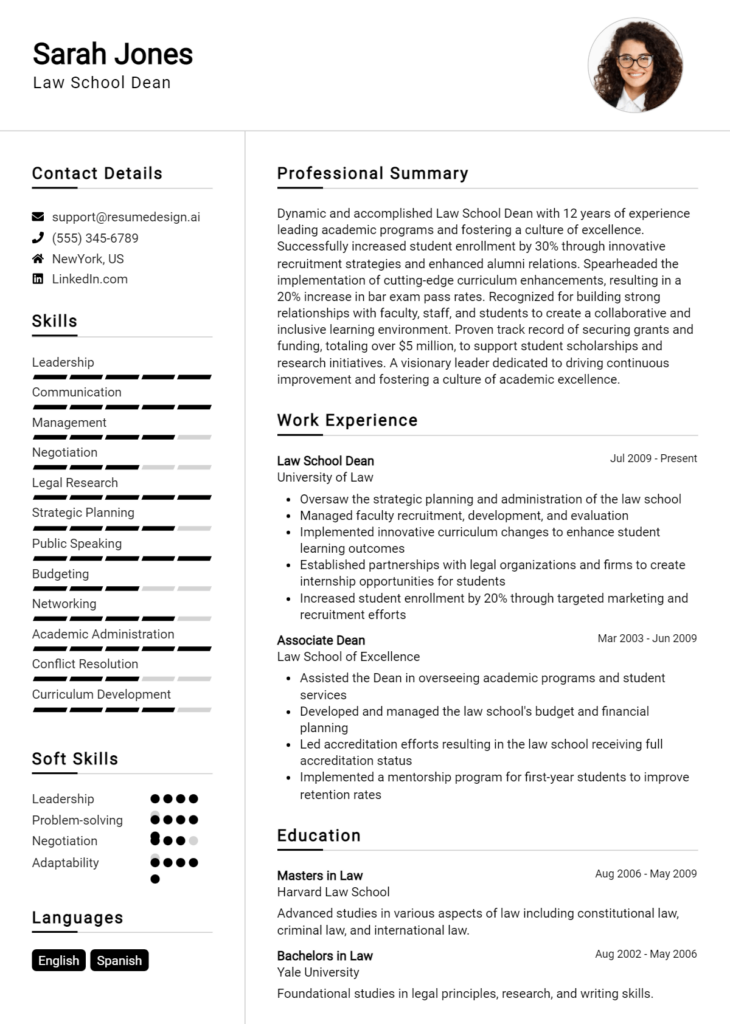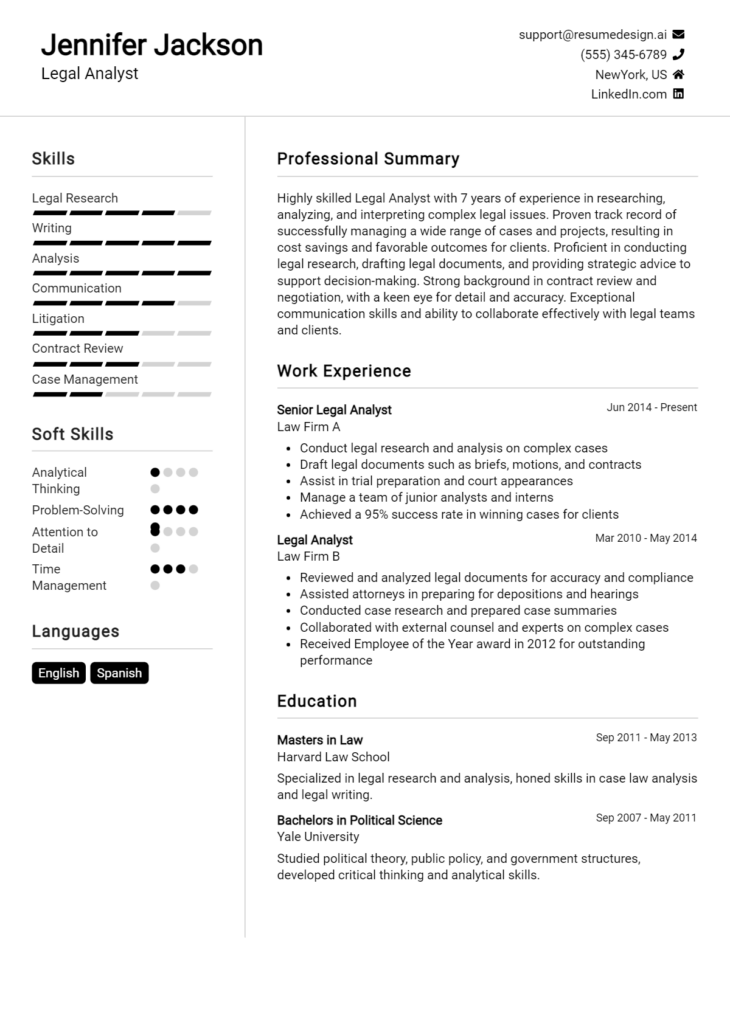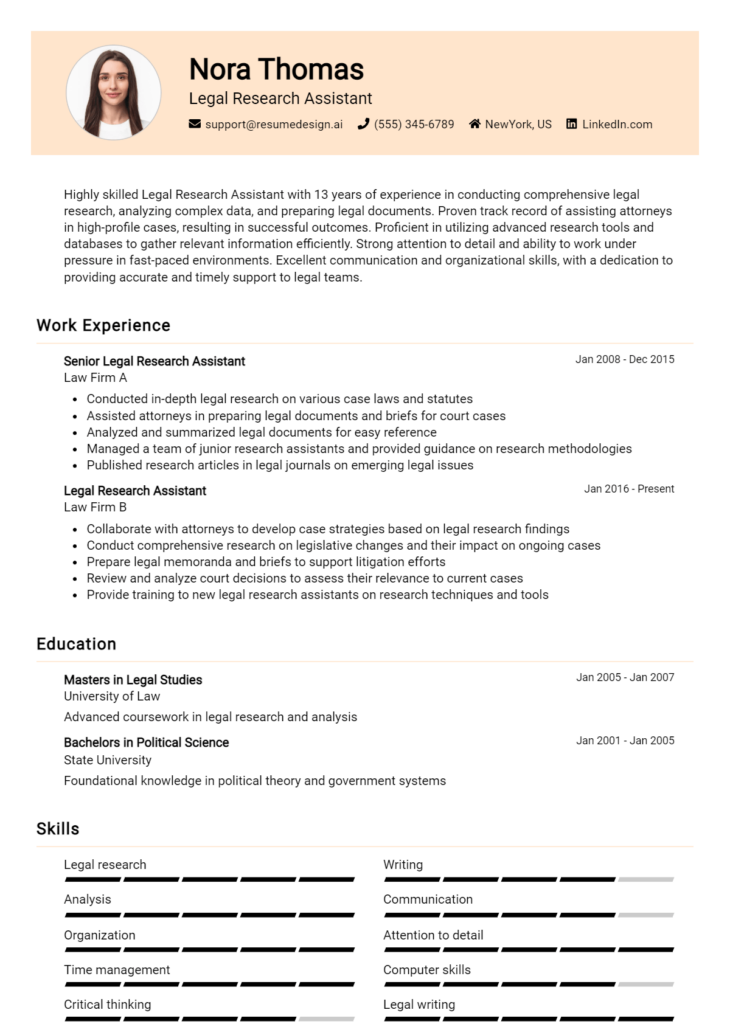Legal Policy Analyst Core Responsibilities
A Legal Policy Analyst plays a pivotal role in bridging various departments by analyzing and developing policies that align with legal frameworks and organizational goals. Key responsibilities include conducting legal research, assessing the impact of legislation, and providing strategic recommendations. Essential skills encompass technical expertise in legal analysis, operational insights, and robust problem-solving abilities. These competencies not only enhance the effectiveness of policy implementation but also contribute significantly to the organization’s overall objectives. A well-structured resume can effectively showcase these qualifications, demonstrating the candidate's value to potential employers.
Common Responsibilities Listed on Legal Policy Analyst Resume
- Conduct comprehensive legal research and analysis of policies.
- Evaluate the implications of new legislation on existing policies.
- Draft detailed reports and policy briefs for stakeholders.
- Collaborate with cross-functional teams to align policy objectives.
- Monitor legislative developments and assess their impact.
- Provide strategic recommendations to improve policy compliance.
- Assist in the development and implementation of internal policies.
- Engage in stakeholder consultations to gather input on policy proposals.
- Prepare presentations to communicate policy findings effectively.
- Identify and analyze potential legal risks associated with policies.
- Support training initiatives on legal compliance and best practices.
- Maintain up-to-date knowledge of relevant legal trends and issues.
High-Level Resume Tips for Legal Policy Analyst Professionals
In the competitive field of legal policy analysis, a well-crafted resume serves as a crucial gateway to career opportunities. It is often the first impression a candidate makes on a potential employer, and as such, it must effectively showcase both skills and achievements that align with the unique demands of the role. A strong resume not only highlights relevant experiences but also conveys a candidate's understanding of the legal landscape and their ability to contribute meaningfully to policy development. This guide will provide practical and actionable resume tips specifically tailored for Legal Policy Analyst professionals, ensuring that your application stands out in a crowded job market.
Top Resume Tips for Legal Policy Analyst Professionals
- Tailor your resume to each job description by incorporating keywords and phrases directly from the posting.
- Highlight relevant legal and policy analysis experience that demonstrates your ability to interpret and apply legal frameworks.
- Quantify your achievements where possible, using metrics to illustrate the impact of your work (e.g., "developed policy recommendations that improved compliance by 30%").
- Showcase your research skills by detailing specific projects or reports you have authored or contributed to.
- Emphasize your understanding of legislative processes and your experience with advocacy or stakeholder engagement.
- Include industry-specific skills such as familiarity with legal databases, statistical analysis tools, or policy simulation software.
- Maintain a clear and concise format that allows for easy scanning, using bullet points to break down complex information.
- Demonstrate your soft skills, such as communication, analytical thinking, and collaboration, which are essential for effective policy analysis.
- Consider adding a summary statement at the top of your resume that encapsulates your expertise and career goals.
- Proofread your resume meticulously to avoid any grammatical errors or typos that could detract from your professionalism.
Implementing these tips can significantly enhance your chances of landing a job in the Legal Policy Analyst field. A polished and targeted resume not only reflects your qualifications but also demonstrates your commitment to the role and your understanding of the industry, making you a more compelling candidate in the eyes of potential employers.
Why Resume Headlines & Titles are Important for Legal Policy Analyst
In the competitive field of legal policy analysis, having a compelling resume headline or title is crucial for standing out to hiring managers. A strong headline serves as a snapshot of a candidate's qualifications, immediately capturing attention and conveying essential information in just a few words. It not only summarizes the applicant's key skills and experiences but also aligns directly with the job being applied for, making it easier for hiring managers to see the candidate's value at a glance. A well-crafted headline should be concise, relevant, and impactful, setting the tone for the rest of the resume.
Best Practices for Crafting Resume Headlines for Legal Policy Analyst
- Keep it concise: Aim for a headline that is no more than 10 words.
- Be specific: Tailor the headline to reflect the specific job title or role.
- Highlight key strengths: Include important skills or accomplishments relevant to legal policy analysis.
- Use action-oriented language: Start with strong verbs that convey proactivity.
- Incorporate industry keywords: Use terms that are commonly recognized in the legal field.
- Reflect your experience level: Indicate whether you are entry-level, mid-career, or an expert.
- Avoid jargon: Ensure your headline is understandable and accessible to all readers.
- Make it impactful: Choose words that convey confidence and competence.
Example Resume Headlines for Legal Policy Analyst
Strong Resume Headlines
Experienced Legal Policy Analyst Specializing in Regulatory Compliance
Dynamic Policy Researcher with a Focus on Environmental Law
Results-Driven Legal Analyst with Proven Record in Legislative Advocacy
Detail-Oriented Legal Policy Specialist with 5+ Years of Experience
Weak Resume Headlines
Legal Analyst
Policy Researcher Seeking Opportunities
Experienced Professional in Law
The strong headlines are effective because they are tailored, specific, and directly related to the role of a Legal Policy Analyst, providing clear insights into the candidate's qualifications and areas of expertise. In contrast, the weak headlines fail to impress due to their vagueness and lack of specificity, leaving hiring managers with little information about the candidate's unique skills or contributions. By focusing on impactful language and relevant details, candidates can significantly enhance their chances of making a positive first impression.
Writing an Exceptional Legal Policy Analyst Resume Summary
A well-crafted resume summary is crucial for a Legal Policy Analyst as it serves as the first impression to hiring managers, allowing candidates to quickly highlight their key skills, relevant experience, and notable accomplishments. In a competitive job market, a strong summary can differentiate a candidate by succinctly conveying their expertise in legal analysis, policy development, and regulatory compliance. It should be concise, impactful, and tailored specifically to the job description, ensuring that it captures the attention of potential employers and showcases why the candidate is the perfect fit for the role.
Best Practices for Writing a Legal Policy Analyst Resume Summary
- Quantify achievements: Use numbers and metrics to demonstrate the impact of your work.
- Focus on relevant skills: Highlight the skills that are most applicable to the job you are applying for.
- Tailor the summary: Customize your summary for each job application to align with the job description.
- Be concise: Keep your summary to 3-5 sentences to maintain clarity and focus.
- Use strong action verbs: Start sentences with powerful verbs to convey a sense of initiative.
- Highlight key accomplishments: Mention specific projects or initiatives that showcase your expertise.
- Showcase your knowledge of policy issues: Include terms or trends relevant to the legal field.
- Maintain a professional tone: Ensure the summary reflects your professionalism and understanding of the field.
Example Legal Policy Analyst Resume Summaries
Strong Resume Summaries
Results-driven Legal Policy Analyst with over 8 years of experience in developing and implementing regulatory frameworks, successfully reducing compliance costs by 30% for multiple clients. Proven expertise in legislative analysis, stakeholder engagement, and drafting policy recommendations that align with organizational goals.
Detail-oriented Legal Policy Analyst with a track record of conducting in-depth research and analysis that directly informed state-wide policy changes, resulting in a 15% increase in funding for community programs. Skilled in collaborating with cross-functional teams to advocate for legal reforms.
Accomplished Legal Policy Analyst with a Master’s degree in Public Policy and over 5 years of experience in environmental law. Led a project that influenced legislation leading to a 20% reduction in carbon emissions in the region, showcasing strong analytical and advocacy skills.
Weak Resume Summaries
Legal Policy Analyst with experience in various legal matters. Interested in improving policies and regulations.
Dedicated professional with a background in law. Looking for opportunities to contribute to policy development.
The strong resume summaries are considered effective because they provide specific examples of the candidate's achievements and skills, incorporating quantifiable outcomes that directly relate to the role of a Legal Policy Analyst. In contrast, the weak summaries are vague and lack measurable results, making them less compelling and failing to adequately convey the candidate's qualifications for the position.
Work Experience Section for Legal Policy Analyst Resume
The work experience section of a Legal Policy Analyst resume is crucial as it serves as a comprehensive showcase of the candidate's technical skills, leadership capabilities, and ability to deliver high-quality outcomes. This section allows candidates to demonstrate how their prior roles have equipped them with the necessary expertise to analyze legal policies effectively, manage teams, and contribute to the development of impactful legal strategies. Importantly, quantifying achievements and aligning experiences with industry standards not only enhances credibility but also makes the resume more compelling to potential employers.
Best Practices for Legal Policy Analyst Work Experience
- Prioritize relevant experience that aligns with the job description.
- Use specific metrics to quantify achievements, such as percentage improvements or cost savings.
- Highlight technical skills related to legal analysis, policy formulation, and research methodologies.
- Emphasize collaborative projects that illustrate teamwork and leadership abilities.
- Describe your role in successful initiatives, including your contributions to outcomes.
- Keep language professional and focused on results-oriented statements.
- Tailor each experience to reflect key competencies mentioned in the job posting.
- Use action verbs to begin each bullet point for a dynamic presentation of tasks.
Example Work Experiences for Legal Policy Analyst
Strong Experiences
- Led a cross-functional team to develop a comprehensive policy framework that reduced compliance costs by 30% over two years.
- Conducted in-depth legal research that informed new legislation, resulting in a 50% increase in stakeholder satisfaction ratings.
- Managed the implementation of a data analytics system that improved policy impact assessments, enhancing reporting efficiency by 40%.
- Collaborated with legal experts to draft policy recommendations that were adopted by state government, influencing over 1 million residents.
Weak Experiences
- Assisted with policy analysis and other tasks as needed.
- Worked on various projects with teams at the office.
- Participated in meetings and contributed ideas.
- Helped with research and documentation for legal policies.
The examples provided highlight the distinction between strong and weak experiences. Strong experiences are characterized by specific, quantifiable outcomes that demonstrate the candidate's impact and technical leadership, while weak experiences lack detail and do not convey significant achievements or contributions. By focusing on measurable results and collaboration, candidates can effectively position themselves as valuable assets in the field of legal policy analysis.
Education and Certifications Section for Legal Policy Analyst Resume
The education and certifications section of a Legal Policy Analyst resume is crucial as it serves to showcase the candidate's academic background, relevant industry certifications, and commitment to continuous professional development. This section not only highlights formal education but also emphasizes specialized training and coursework that directly pertains to legal policy analysis. By providing this information, candidates can significantly enhance their credibility and demonstrate their alignment with the expectations of the job role, making a strong case for their qualifications and expertise in the field.
Best Practices for Legal Policy Analyst Education and Certifications
- Highlight degrees from accredited institutions relevant to law, public policy, or political science.
- List industry-recognized certifications such as Certified Government Financial Manager (CGFM) or Certified Policy Analyst (CPA).
- Include relevant coursework that showcases specialized knowledge, such as courses in administrative law, regulatory policy, or ethics.
- Detail any continuing education programs or workshops that highlight ongoing professional development.
- Provide the graduation date or expected date to showcase recent education.
- Prioritize certifications that are recognized by industry bodies or governmental organizations.
- Integrate any honors or distinctions received during academic pursuits that underscore excellence.
- Keep the information concise and relevant to the position being applied for, avoiding unrelated fields of study.
Example Education and Certifications for Legal Policy Analyst
Strong Examples
- Master of Public Policy (MPP), Harvard Kennedy School, 2022
- Certified Policy Analyst (CPA), Policy Studies Organization, 2023
- Relevant Coursework: Administrative Law, Public Sector Ethics, and Regulatory Analysis
- Bachelor of Arts in Political Science, University of California, Berkeley, 2020
Weak Examples
- High School Diploma, Springfield High School, 2015
- Certification in Basic Computer Skills, Local Community Center, 2020
- Non-relevant Coursework: Introduction to Psychology, Art History
- Online Certificate in Social Media Marketing, 2021
The examples listed as strong are considered appropriate for a Legal Policy Analyst as they reflect relevant degrees, recognized certifications, and applicable coursework that align with the profession's demands. Conversely, the weak examples illustrate qualifications that are either unrelated to the legal field or do not demonstrate a serious commitment to the necessary skills and knowledge required for success in the role, thereby detracting from the candidate's professional profile.
Top Skills & Keywords for Legal Policy Analyst Resume
In the competitive field of legal policy analysis, having the right skills is paramount to crafting a standout resume. A Legal Policy Analyst must not only possess a deep understanding of legal frameworks but also exhibit analytical thinking, research capabilities, and effective communication skills. These competencies help professionals navigate complex legal landscapes and contribute meaningfully to policy development. By highlighting these essential skills on your resume, you can demonstrate your qualifications and readiness to tackle the challenges posed by this critical role in the legal sector. For more insights on how to effectively showcase your skills and work experience, continue reading.
Top Hard & Soft Skills for Legal Policy Analyst
Soft Skills
- Critical thinking
- Effective communication
- Attention to detail
- Problem-solving
- Adaptability
- Team collaboration
- Time management
- Research proficiency
- Negotiation skills
- Ethical judgment
- Interpersonal skills
- Analytical mindset
- Creativity in policy design
- Conflict resolution
- Public speaking
Hard Skills
- Legal research and writing
- Policy analysis
- Data analysis and interpretation
- Familiarity with legal databases (e.g., Westlaw, LexisNexis)
- Legislative tracking
- Knowledge of regulatory compliance
- Quantitative analysis
- Statistical software (e.g., SPSS, R)
- Project management
- Understanding of administrative law
- Proposal drafting
- Risk assessment
- Knowledge of international law
- Advocacy strategies
- Budgeting and financial analysis
- Computer proficiency (MS Office, legal software)
- Survey design and analysis
By integrating both soft and hard skills into your resume, you can create a well-rounded representation of your capabilities as a Legal Policy Analyst.
Stand Out with a Winning Legal Policy Analyst Cover Letter
I am writing to express my interest in the Legal Policy Analyst position at [Company Name], as advertised on [Job Board/Company Website]. With a solid background in legal research, policy analysis, and advocacy, combined with my passion for developing effective legal frameworks, I am confident in my ability to contribute to your team. My experience working with various stakeholders, including government agencies and non-profit organizations, has equipped me with the skills necessary to navigate complex legal issues and provide data-driven recommendations.
In my previous role at [Previous Company/Organization], I successfully led a project analyzing the impact of proposed legislation on community resources, which involved conducting thorough legal research, drafting reports, and presenting findings to both legal teams and community leaders. I developed a reputation for my attention to detail and ability to communicate complex legal concepts in an accessible manner. My collaborative approach enabled me to work closely with cross-functional teams to create policy proposals that aligned with organizational goals while addressing the needs of impacted populations.
I am particularly drawn to the mission and values of [Company Name], especially your commitment to [specific value or project relevant to the company]. I believe my analytical skills and passion for public policy will allow me to make a meaningful contribution to your ongoing efforts. I am eager to bring my expertise in legal analysis and my proactive approach to policy development to your esteemed organization, helping to craft policies that reflect both legal standards and societal needs.
Thank you for considering my application. I look forward to the opportunity to discuss how my background, skills, and enthusiasms align with the goals of [Company Name]. I am excited about the possibility of being part of a team that shapes impactful legal policies and fosters positive change in the community.
Common Mistakes to Avoid in a Legal Policy Analyst Resume
When crafting a resume for a Legal Policy Analyst position, it's crucial to present your qualifications and experiences in a clear and compelling manner. However, many applicants make common mistakes that can detract from their application, leading to missed opportunities. Avoiding these pitfalls can enhance your chances of standing out in a competitive job market. Here are some common mistakes to steer clear of:
Vague Job Descriptions: Failing to provide specific details about past roles can leave hiring managers unsure of your actual experience. Use quantifiable achievements and clear responsibilities.
Neglecting Relevant Skills: Omitting key skills relevant to legal policy analysis, such as research, analytical thinking, and knowledge of legal frameworks, can hinder your application. Tailor your skills section to match the job description.
Using Generic Language: Employing bland or overused phrases like "hardworking" or "team player" without evidence can weaken your resume. Instead, demonstrate your contributions through concrete examples.
Poor Formatting: A cluttered or inconsistent format can make your resume difficult to read. Use clear headings, bullet points, and a professional font to present your information neatly.
Including Irrelevant Experience: Listing jobs that do not relate to legal policy analysis can dilute your resume's impact. Focus on experiences that showcase your relevant skills and knowledge.
Ignoring Keywords: Many employers use applicant tracking systems (ATS) to filter resumes. Failing to include relevant keywords from the job listing may result in your resume being overlooked.
Overloading with Information: Providing too much information can overwhelm the reader. Aim for a concise resume that highlights the most relevant experiences and skills within one to two pages.
Neglecting Proofreading: Spelling and grammatical errors can create a negative impression and suggest a lack of attention to detail. Always proofread your resume multiple times or seek feedback from others before submission.
Conclusion
As we explored the essential responsibilities and skills of a Legal Policy Analyst, it’s clear that this role demands a blend of analytical thinking, legal expertise, and communication prowess. Legal Policy Analysts play a crucial role in shaping policies and ensuring compliance with laws and regulations. They must stay informed about legal trends and possess the ability to interpret complex legal documents, evaluate policies, and recommend improvements.
Furthermore, the article emphasized the importance of having a well-crafted resume that highlights relevant experience, education, and skills to stand out in this competitive field. Whether you are just starting your career or looking to advance, presenting your qualifications effectively is paramount.
Now is the perfect time to review your Legal Policy Analyst resume to ensure it reflects your expertise and aligns with the expectations of potential employers. Utilize the various resources available to enhance your application materials, including resume templates, a handy resume builder, insightful resume examples, and professional cover letter templates. Take action today and ensure your resume showcases your potential in the legal policy landscape!

